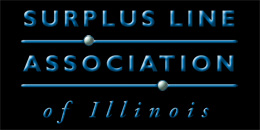Bulletin #43: Changes to Surplus Line & Related Laws / Stamping Fee Reminder
Public Act 98-0978 became effective on January 1, 2015. The Act makes a number of changes to the Surplus Line Law and some related sections of the Illinois Insurance Code. A summary of the changes is set forth below, as well as a reminder about the Association’s new stamping fee rate:
Industrial Insured / Independent Procurement
Changes in this section have updated the specifications to qualify as an "industrial insured." Policies independently procured from unauthorized insurers by industrial insureds that are effective January 1, 2015 or later, are now subject to filing requirements and tax.
- In order to qualify as an industrial insured, the insured must be an "exempt commercial purchaser" as the term is defined in the surplus line law. This includes retaining a “qualified risk manager” as that term is defined in the law.
- An industrial insured may independently procure from an unauthorized insurer most types of insurance, except health insurance or insurance where a statute requires an authorized insurer (for example, primary Workers’ Compensation and primary auto liability).
- Policies procured under this section that are effective January 1, 2015 or later must be filed with the Surplus Line Association within 90 days of the effective date.
- These policies are taxed at the same rate as surplus line transactions (currently 3.5%) and the taxes must be paid within 30 days of filing the report with the Surplus Line Association.
- The insured may withhold the amount of tax and stamping fee from the amount of premium payable to the insurer.
- IP filings can be made at https://www.slai.org/ipfile. For more information, click here.
Surplus Line Tax Refunds
Surplus line producers and industrial insureds are added to the refund section of the law which, for the first time, qualifies them, under certain circumstances, to obtain a refund for overpaid tax.
- In order to qualify for a refund, the overpayment must have occurred within the six years prior to discovery.
- The amount may be refunded by applying it to current or future taxes due or, upon written request, the Director can refund the tax within 120 days of receiving the information necessary to audit the applicable tax report.
- No refunds are issued if the overpayment is less than $100, if the amount of overpayment can be offset against the estimated tax liability for the following year, or if there are insufficient funds in the Insurance Premium Tax Refund account (a special fund in the State treasury).
- You can view the full text of the refund section of the law (215 ILCS 5/412, paragraph 1).
Surplus Line Tax Late Fines & Penalties
A graduated scheme of penalties for late tax statement filing and late tax payment is introduced that caps the late fees when the tax filings or payments are one, two or three weeks late.
- If the filing of the tax statement is late, the late fee is $400 or 10% of the tax due (whichever is greater) but is capped at $1,000 if one week late, $1,500 if two weeks late, and $2,000 if three weeks late. If the filing is more than three weeks late, this is considered a "penalty" instead of a late fee.
- If the payment of taxes is late, the late fee is 10% of the tax due but is capped at $1,000 if one week late, $1,500 if two weeks late, and $2,000 if three weeks late. If the payment is more than three weeks late, this is considered a "penalty" instead of a late fee.
- If the payment of taxes is late, there is also interest due at 12% per annum or higher and the interest is not capped.
- There may be higher penalties if the failure to pay is determined to be wilful.
Surplus Line "Home State" Definition
State and federal definitions that guide a producer when determining the "home state" of an insured in a surplus line transaction have historically not addressed situations where a group of multiple insureds, who are not affiliated, are all covered on a single policy. Language has been added to fix this omission in the state statute.
- If the individual insureds pay 100% of the premium for their coverage from their own funds then a home state determination must be made for each insured separately and taxes and filings are made with the individual insured's home state.
- If the group pays any portion of the premium, the group's home state applies to all transactions for the policy, regardless of group member locations, and all taxes and filings go to the group's home state.
Surplus Line Insurer Eligibility
Previously, insurers based outside the U.S. could only be used if they were on the IID list. The language has been changed to allow surplus line producers to use insurers based outside of the U.S. if they are on the IID list or if they meet the same qualifications applicable to insurers domiciled in the U.S. So now, the Illinois surplus line insurer eligibility requirements are:
- For insurers domiciled in the United States, the insurer must: (1) be permitted, in its domiciliary jurisdiction, to write the type of insurance involved; and (2) have at least $15 million in policyholder surplus; and (3) have standards of solvency and management that are adequate for the protection of policyholders.
- For insurers domiciled outside the United States, the insurer must: (1) be on the Quarterly Listing of Alien Insurers published by the International Insurers Division (“IID”) of the NAIC; or (2) meet the standards set forth above for insurers that are domiciled in the United States.
Surplus Line Record Retention
The Illinois surplus line law has previously never set a record retention period for surplus line producers. Language has been added to the law to set the retention period at 7 years from the policy effective date.
Other Technical Changes
There is a technical change to correct an internal inconsistency in the law regarding when surplus line policies are subject to tax and the statute is updated to be in line with the Association's Plan of Operation which already requires the Association to submit its audited financial statements to the Director each year.
Stamping Fee Reminder
You are also reminded that the Association stamping fee is now 0.2% (two tenths of one percent) for policies with an effective date of January 1, 2015 or later. The previous stamping fee will still apply to policies with an effective date prior to January 1, 2015 and to any endorsements to those policies. Remember – for all endorsements, the effective date of the policy (not the effective date of the endorsement) determines the stamping fee rate. See Bulletin 42 for complete details.
Please feel free to contact our office with any questions regarding this bulletin.
05-Jan-2015
Disclaimer
The materials and information contained herein are only synopses of laws, regulations and other information and do not constitute legal advice. It is recommended that you consult your legal advisers regarding application of state and federal laws and regulations to any particular situation. The Surplus Line Association of Illinois (SLAI) does not undertake and hereby disclaims any obligation to advise you of any change to laws and regulations or to the SLAI procedures.
|



